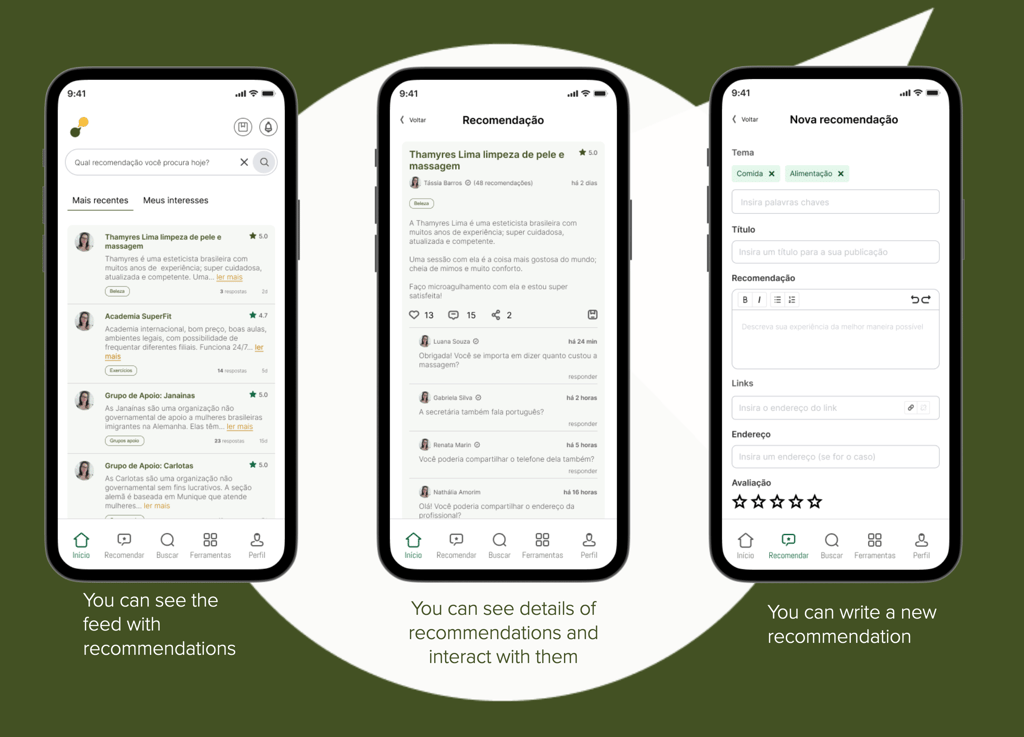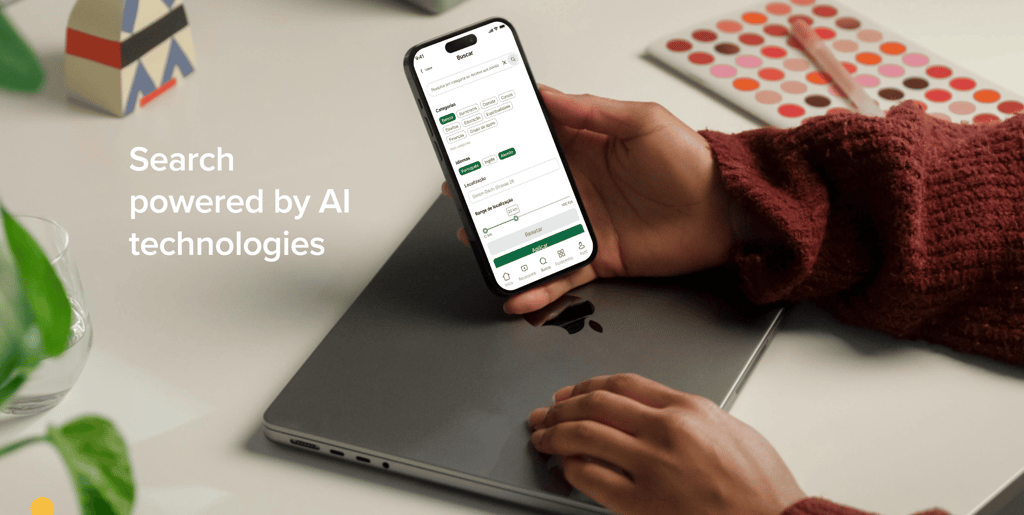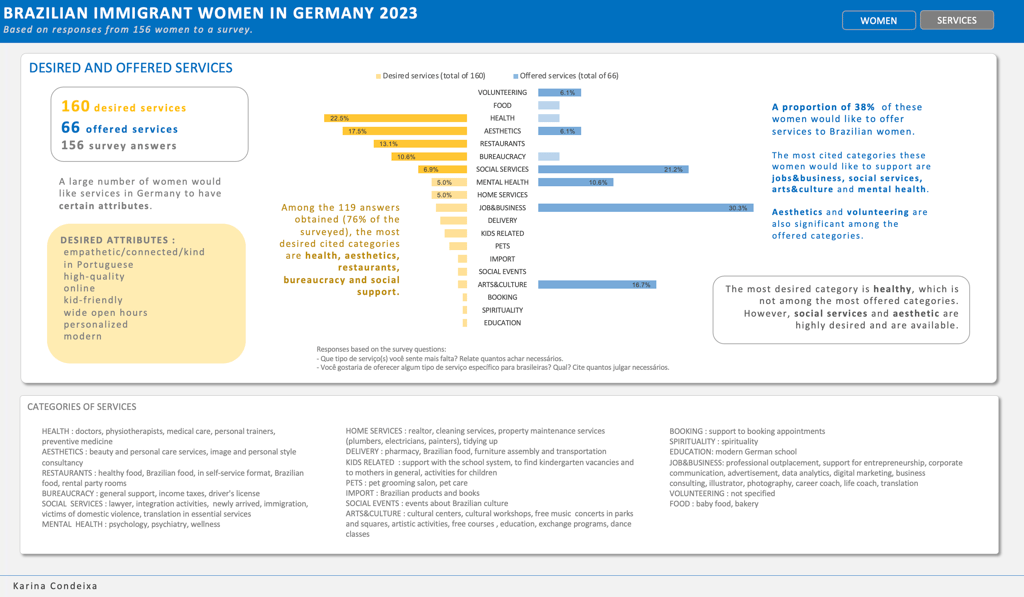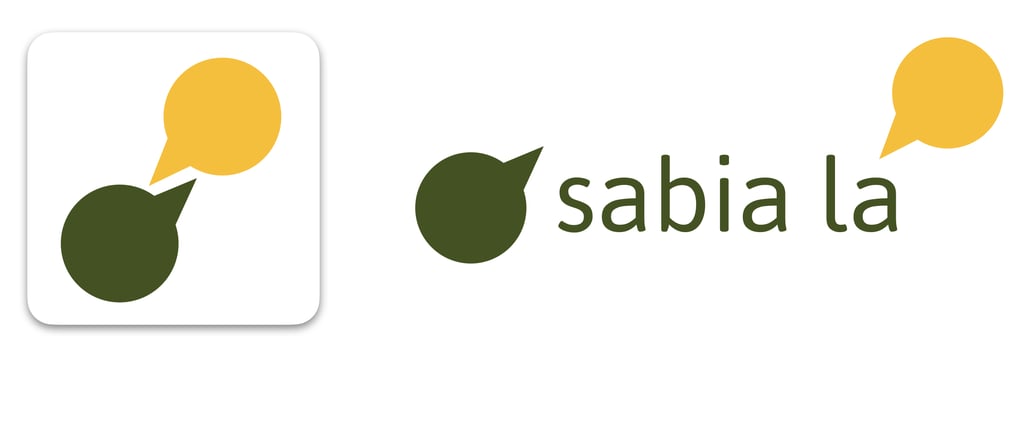Want a Startup Idea to Steal?
If you are looking for an idea, here's one on a silver platter. Would you like to give it a try?
INNOVATIONIDEAS
[Ligia Fascioni]
2/15/20258 min read
In a nutshell
What started as a marketplace for Brazilian entrepreneurs in Germany evolved into something much bigger — a platform concept that solves a universal immigrant challenge: finding trustworthy local recommendations.
While our volunteer team moved on to other ventures, we've developed a validated concept, complete with brand identity and prototypes, ready for an entrepreneur who wants to transform how immigrant communities share and access vital local information.
How we arrived at this insight and what we learned along the way, we'll dive deeper in the following sections.


After years working as an electrical engineer in automation and robotics, followed by more years as a professor, speaker, and consultant (in design, leadership, and innovation), I decided it was time for a career change. Since I was already familiar with innovation processes, design thinking, service design, and even UX Design, I chose to move in that direction.
I completed training programs (a full-time bootcamp and a professional UX/UI Design certification), and while job hunting, I looked for projects for my portfolio.
In early 2024, a dear friend offered her website as a case study. The idea was for the site to be a hub for Brazilian women entrepreneurs living in Germany to sell their products and services, like a marketplace.
I accepted, but with one condition: I would do the work properly, from the beginning. That meant starting with research among our audience of interest (Brazilian immigrant women living in Germany) to better understand their pain points and needs.
We collected 156 responses, and another volunteer, data analyst Karina Condeixa, processed the data and published a detailed analysis.
How it all began
Karina brought us surprising insights, as we can see in the following dashboard: 76% of respondents wanted reliable recommendations for health, beauty, restaurants, bureaucracy, and social support.
On the other hand, 38% of these women wanted to offer their services (including on the platform). However, they offered help in business, work, social, arts, culture, and mental health areas.
In summary, the health sector, desired by 23% of respondents, wasn't among the most offered categories. Meanwhile, beauty and social services categories had both supply and demand.
This meant we didn't have enough balance between supply and demand to sustain a marketplace. In fact, during competitor research, we discovered that one already existed but was little known and used, for the reasons we just observed.
At this point, the project completely changed. Analyzing the insights, I did my work as a UX Designer, combining previous knowledge in business, management, design management, innovation, and corporate identity, and thought of a solution that would meet the needs of this audience: a platform where immigrants could exchange reliable and relevant recommendations about services or products desired by the community.
In reality, all this information already exists, but it's scattered across WhatsApp groups, Facebook, Slack, and other social networks in a chaotic, disorganized, and often outdated manner. The result is that these groups are always flooded with the same questions: "Does anyone know an accountant who understands double taxation?"; "Can someone recommend a hairdresser who knows how to handle curly hair?"; "Does anyone know where to find cassava flour?"
The idea was to create a platform, or a social network, aimed at Brazilian immigrants where this information could be centralized, evaluated, and commented on in an organized and updated way. The content would be produced collaboratively, with people sharing their experiences and recommendations.
concept change
Since the original market was the Brazilian audience, the brand was created with the name Sabialá. The short and sonorous name could be interpreted in several ways, all consistent with the concept:
The Sabiá-laranjeira is Brazil's symbolic bird; we tried to associate birds with the concept of nest, welcoming, home. But also communication and relocation (when changing nests, or countries).
"Sabia" is the past tense of the verb "to know" in Portuguese; "lá" means "there" in English. So we're talking about a place where people know, because they are there, in the destination place.
And "sábia" means "wise woman," one who knows, so she can recommend (just referring to the fact that, initially, the marketplace was aimed only at women). With the solution changing to a recommendation network, everyone was included.
The graphic mark could be read as two bird heads talking (seen from above) or two speech bubbles. The colors also referred to the Brazilian flag (green and yellow, both warm colors, referring to warmth and welcome).
NOTE: If you don't like this name, I have another idea.
THE BRAND
After defining personas and their journeys, affinity maps, idea generation, competitive audits, reference research, and the entire process, two medium-fidelity prototypes were developed to test some functionalities and the best organization for the information, as well as the most used features.
A benchmarking study was also conducted with recommendation and rating apps (TripAdvisor, Airbnb, Booking, Google, etc.), social networks with organized questions and answers (Quora, Reddit, etc.), and sites that offered various products and services in a categorized and ordered way (KleinAnzeigen, eBay, etc.).
In the competition research, we discovered that something similar had already been developed in New York focusing on Jewish immigrants. The app, called HomeIs, was founded in 2017 and received a $12 million investment in 2019. However, the domain is currently for sale, and the app is no longer found.
There are also several sites that offer consulting to solve bureaucracies in Germany (including Brazilian professionals who provide the service), specific platforms for health professional recommendations (such as DoctoLib), and many profiles sharing important information. But nothing that gathers everything in one place, where you can ask a question and get a simple, relevant, and reliable answer.
At this point, the work team changed. The Marketplace founders and another volunteer left the team. Besides me, the new configuration of volunteers included a more experienced UX Designer/Product Designer (Tássia Barros), kept the Data Analyst (Karina Condeixa) who also took over project management, and a full-stack engineer Viviane Gnutzmann.
RESEARCH AND DISCOVERY TIME
To continue, we needed proof of concept, showing that people really needed the idea we were proposing. For this, we launched another survey.
This time, we chose to expand the universe of interviewees. The audience of interest would be any adult (over 18 years old), residing in Germany and Portuguese-speaking. The idea was to include the Portuguese, Angolan, and other Lusophone communities, but out of 246 respondents, only 4 (Portuguese) were not Brazilian, the majority (75%) residing in Berlin, and the majority (73%) living there for more than 2 years. About 40% were over 35 years old.
We discovered that 76% prefer to ask for recommendations from acquaintances, and 87% give recommendations when published on social networks. They always search in online communities (Facebook, WhatsApp, etc.) and also search on Google, despite being dissatisfied with the results found (confusing, without known references, etc.).
In other words, a tool that organized all this information in just one place would save a lot of time.
PROOF OF CONCEPT


We also had the opportunity to participate in a feedback event from the Service Design Drinks Berlin Startup Edition group.
When Laura Soto invited us to present the project at this event, I remembered everything I had studied about Service Design and Design Thinking years ago and realized that, having recently changed careers, the idea of building an app, although obvious, might not be the best way to solve this problem. Or is it?
The participants were very helpful and left dozens of comments and suggestions. Some advocated that the best contact is personal, without the interference of gadgets, but recognized the difficulty of managing a large volume of data (recommendations, evaluations, comments, requests, etc.) in real-time. Several suggested using an AI chatbot to curate, organize, and present the data that is already in the groups.
In any case, most of the contributions suggested features and other reference apps. That is, probably the best way to solve this problem is really an app or platform to centralize information and facilitate access.
SERVICE DESIGN
Our group was formed by female volunteers, all of them career changers, who had other parallel projects, in addition to also participating in job interviews.
Even so, we deepened the study to understand our potential users, started a third version of the prototype, began high-fidelity prototype screens, worked on the MVP, and refined the idea even more.
In the search for some kind of financial support (we had to register the brand, domain, have a server to start the project, software, in addition to our own personal expenses), we began to research the possibilities.
We developed a comprehensive strategy with two potential paths:
We could either focus on Brazilian immigrants worldwide (totaling about 4.6 million people);
or pursue a broader approach serving multiple languages and cultures.
In Germany alone, 15.8 million immigrants live — with 281 million people living outside their country of origin around the world). Either way, the business had potential.
We enrolled in some programs; in the Berlin Startups Scholarships — BSS Women, we were even selected for the Pitch presentation, but we didn't get the scholarship.
The fact is that an entire year passed, and the volunteers got jobs and followed their priorities.
The conclusion is that none of us has the profile to be a startup CEO. This world of pitches, negotiations, business plans, revenue forecasts, growth and expansion goals didn't make any of our eyes shine. We wanted to do the technical part, refine the idea more and more, and make the application available to people.
It was a year of incalculable learning, the friendship between us strengthened, in addition to the mutual admiration that only grew.
Each of us followed our path. The market is not absorbing people who have recently changed careers (and are in the junior or entry-level category), due to the excess of very experienced professionals placed on the market in successive layoffs of technology companies, so we had to reinvent ourselves.
In my case, I plan to continue working in the area of innovation and technology, but not running a startup.
It Wasn't That Simple


Encouraged Theft
But it's a huge pity every time I enter a WhatsApp group and someone asks (again and again) for recommendations for a lawyer, driver, career coach, consultant for bureaucratic issues, etc. Always the same questions that could be answered by an intelligent app or a platform.
If you were looking for an idea, here's one on a silver platter.
The details are the result of the work of a group of people who thought long about the problem. But nothing we can't talk about to understand how we can collaborate.
We really wanted this platform to exist; we're sure many people could benefit from it.
Would you like to give it a try?




